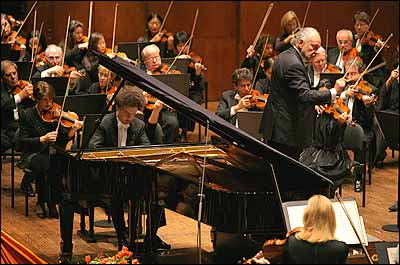
A requiem mass hardly seems the most festive choice to inaugurate a concert season, and no particular person or dire event was being memorialized as Sir Colin Davis guided the London Symphony Chorus and Orchestra through Verdi’s Messa da Requiem in Avery Fisher Hall to start the season’s “Great Performers” series. But no doubt everyone in the audience had someone or something in mind. For Verdi, the immediate purpose was to honor an Italian artist whom he revered—the novelist Alessandro Manzoni, who had died at 88 on May 22, 1873—and in the process he wrote one of music’s most stirring and moving ecumenical statements, a gripping spiritual drama that crosses all faiths. A critic once called the Requiem Verdi’s greatest tragic opera, and by the last thudding chords, after the soprano soloist has whispered her urgent plea for deliverance from eternal death, most would probably agree.
Up to now, Italian conductors have presided over the Verdi Requiem performances that I remember best: Guido Cantelli, Claudio Abbado, Carlo Maria Giulini, and Riccardo Muti onstage, not to mention recorded versions by Toscanini, Serafin, and De Sabata. Whiplash dramatic accents, lyrically shaped thematic arcs, diamantine orchestral textures, and seamless integration of voices and instruments are what this score requires most of all, and Italian maestri seem to cultivate and combine those musical virtues as few others do. Now we can add Colin Davis to the list. Surely Sir Colin has an Italian nonna somewhere in his family, so thoroughly and with such passionate Mediterranean conviction does he enter into Verdi’s world.
I wouldn’t have expected a performance this intense or unbuttoned from Davis earlier in his career—even his decade-old recording of the Requiem with the Bavarian Radio Orchestra sounds positively prim by comparison. Long admired for his refined balance of sense and sensibility, Davis has retained that valuable asset in old age while adding the fantasy and risk-taking that now give his interpretations the textural richness and powerful immediacy we hear each time he and the LSO visit Lincoln Center. Even the solo quartet was deluxe—Anne Schwanewilms, Ildiko Komlosi, Stuart Neill, and Orlin Anastassov—and the choral quality at all dynamic levels sounded ravishing.
The New York Philharmonic opened its new season more conventionally, with a superstar pianist (Evgeny Kissin) playing a certified masterpiece (Beethoven’s “Emperor” Concerto) and Lorin Maazel conducting a pair of well-worn Richard Strauss showpieces (Don Juan and a suite from Der Rosenkavalier). Kissin gave a glossy, emotionally remote account of the Beethoven while the orchestra played with icy perfection for its music director, setting the tone for a Philharmonic season that looks rosy for management no matter how much critics crab about the conservative programming. After all, attendance is up, the musicians apparently continue to worship Maazel, and audiences are clearly content not to be challenged. Yes, it’s today’s New York Philharmonic, whose utter lack of musical adventure surely makes it the most boring major orchestra in the world.
The music for Carnegie Hall’s opening-night gala was not much more exploratory: Rachmaninoff’s Third Piano Concerto, played by Yefim Bronfman, and Tchaikovsky’s Fifth Symphony. It was, however, rather daring to invite the St. Petersburg Philharmonic and its artistic director, Yuri Temirkanov, to participate. Neither the band nor its conductor is exactly a glamorous global name, although back in the Soviet era, when the St. Petersburg was known as the Leningrad Philharmonic, the orchestra’s reputation in the West was the stuff of legend thanks to the charismatic mystique of its music director from 1938 to 1988, Evgeny Mravinsky.
There can’t be many musicians left in the orchestra from that golden age, but the St. Petersburg Philharmonic still makes the same big, fat, ripe sound and digs into these most mournfully melodic of Russian composers with the same unrestrained abandon. Some may have found it all a trifle vulgar perhaps, but they are probably the same people who still consider Rachmaninoff and Tchaikovsky composers not to be taken seriously. In any case, no Western orchestra plays this music in quite the same unbridled way or with so much instrumental panache, and that alone gave Carnegie’s kickoff concert a real festive flavor.
Messa da Requiem
Verdi.
London Symphony Orchestra and Chorus.
September 28.
Opening-Night Gala
New York Philharmonic.
Avery Fisher Hall.
September 21.
Opening-Night Gala
St. Petersburg Philharmonic.
Carnegie Hall.
september 29.